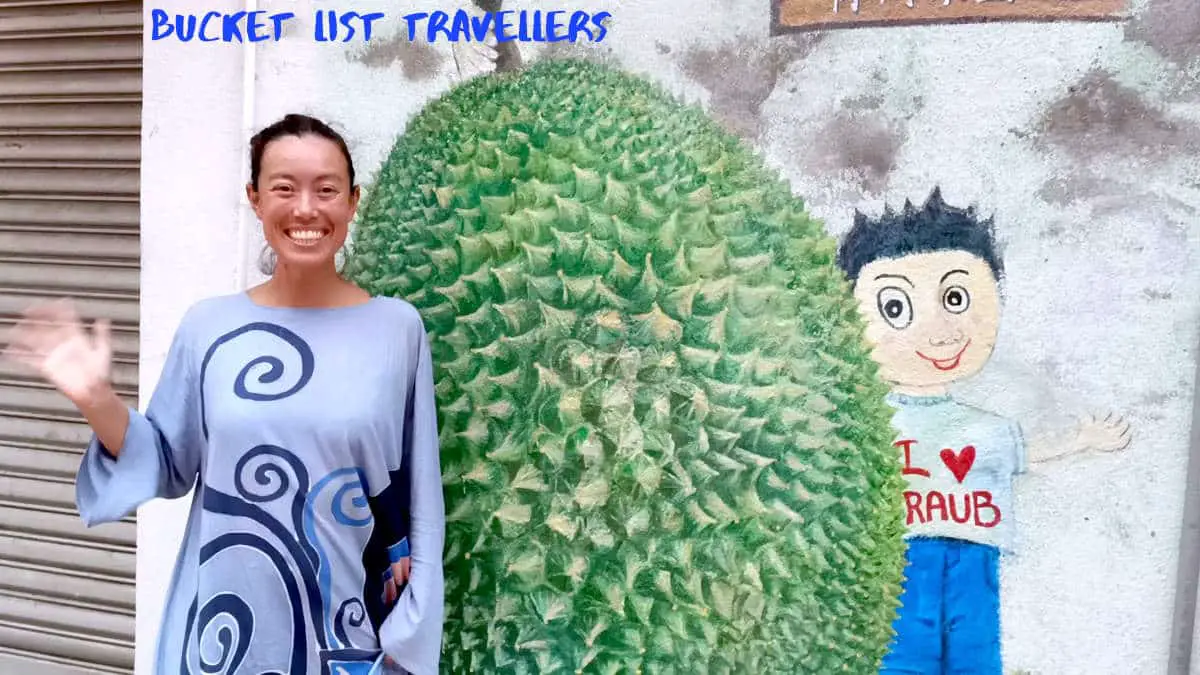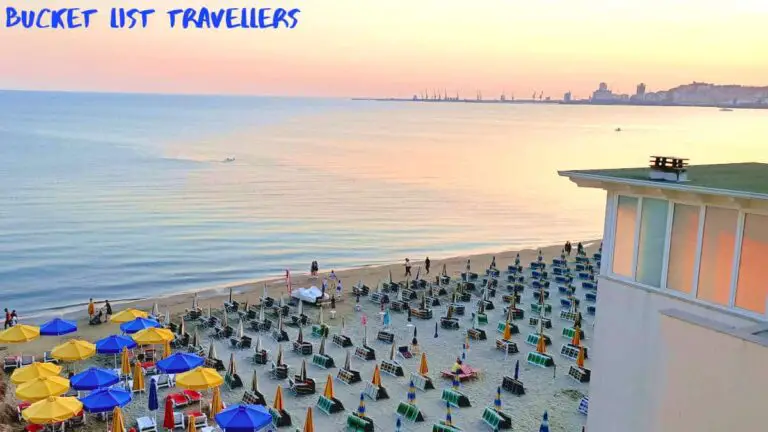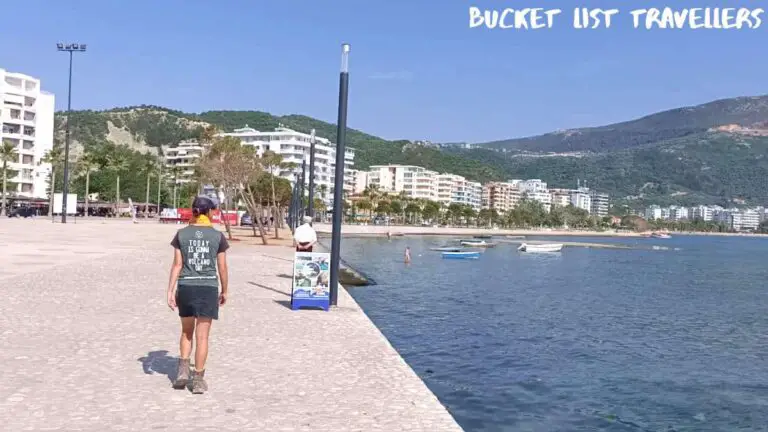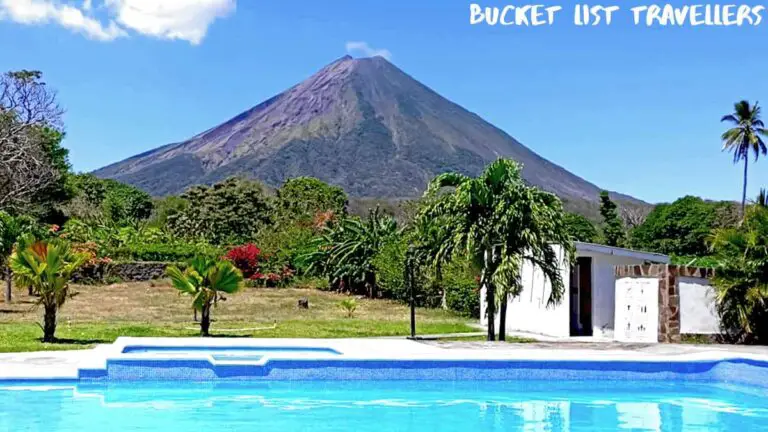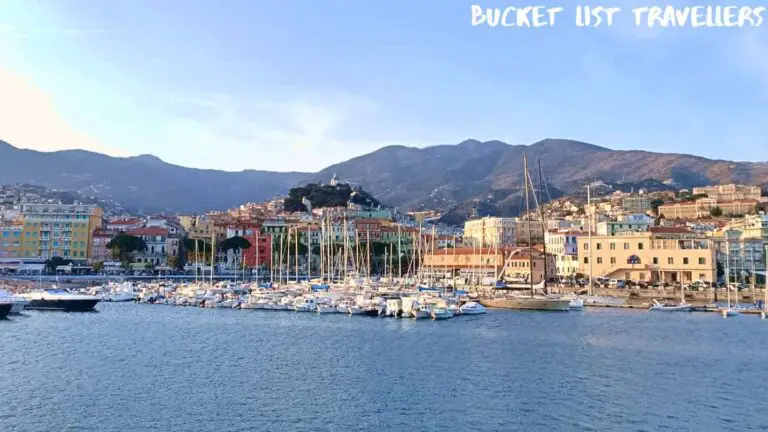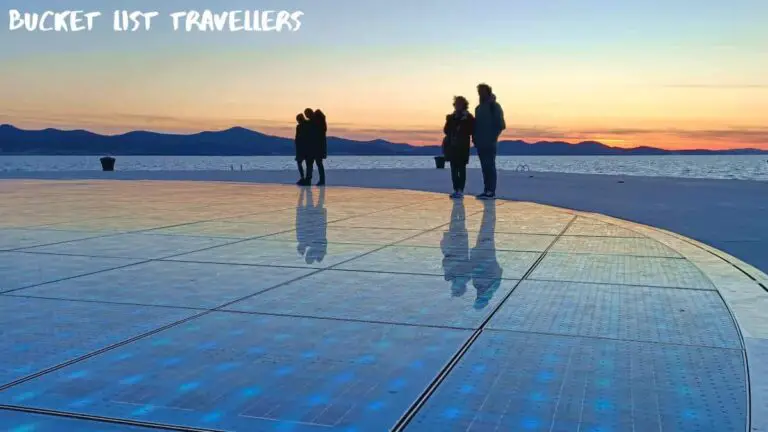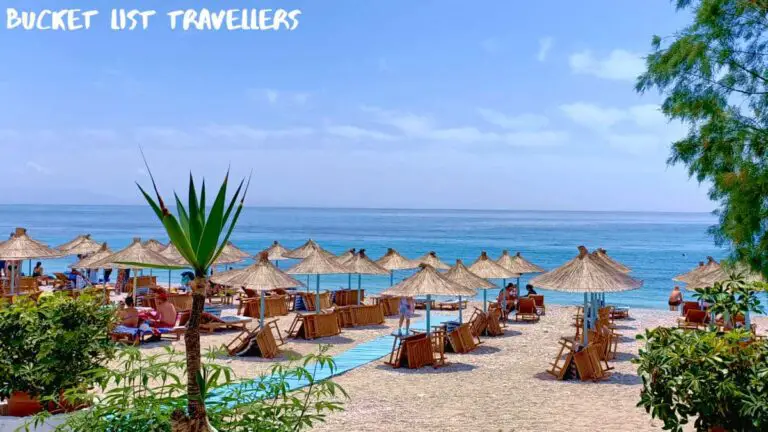The Malaysian capital of gold, Raub is one of the oldest towns in the state of Pahang. Gold in this area was so plentiful that you could scoop it up with your hands. In fact, the town’s name is the Malay word for “scoop”. Malaysia’s gold rush of the late 1800s centred around this town in an area known as Bukit Koman. Today some gold mining continues in the area, however the town is now best known as the durian capital of Malaysia. Nature attractions and outdoor activities are also popular in the area and the town is the gateway to the popular resort areas of Fraser’s Hill, the Genting Highlands as well as the Cameron Highlands. Find out more in this Raub destination guide.
What is Raub Malaysia famous for?
Raub first became famous for gold. In 1889 Raub gained international fame when the Raub Australian Gold Mine Co. Ltd began mining operations in the area. Nowadays this historic old mining township is more well known for as the durian capital of Malaysia.
Why you should visit Raub Malaysia
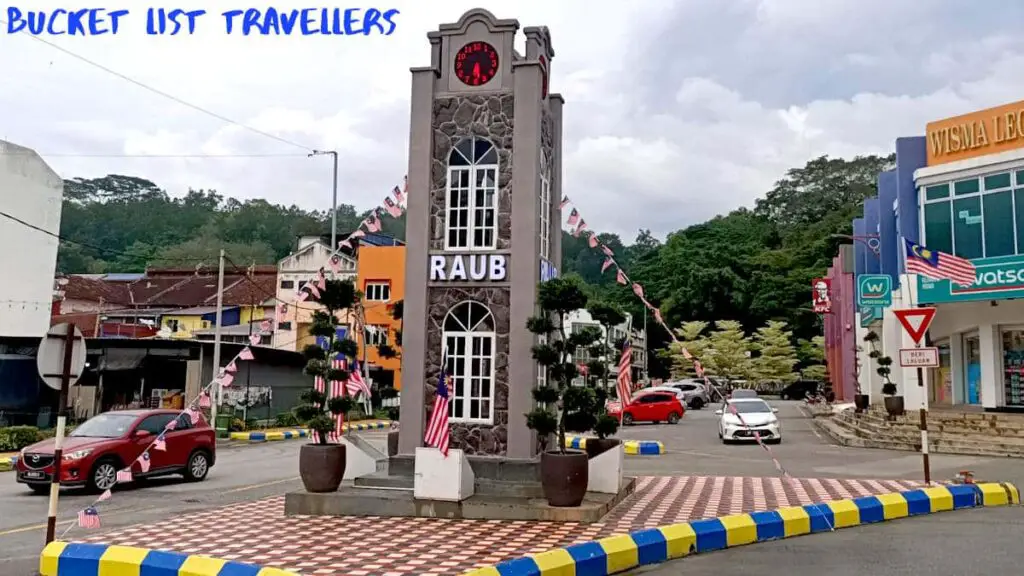
Raub is a town with a long and interesting history. It came to prominence in Malaysia’s gold rush and was Malaysia’s El Dorado from the early 19th century until 1961. Once mining dried up, the town pivoted its focus to agriculture. While gold mining activity in the area recommenced in 2011, the area is now know better known for its durian farming. In fact, most of the world’s Musang King durians come from Raub. Other activities in the area include outdoor sports such as fishing, whitewater rafting and kayaking. Raub is surrounded by beautiful hillside and is also the perfect launchpad to Fraser’s Hill, the Genting Highlands and the Cameron Highlands. In the town itself, there are some beautiful colonial era buildings to admire. There are also a number of religious buildings of different faiths standing side-by-side – a testament to the wonderful blend of cultures in Malaysia.
Raub Destination Guide: Know before you go
Basic info about Raub Malaysia
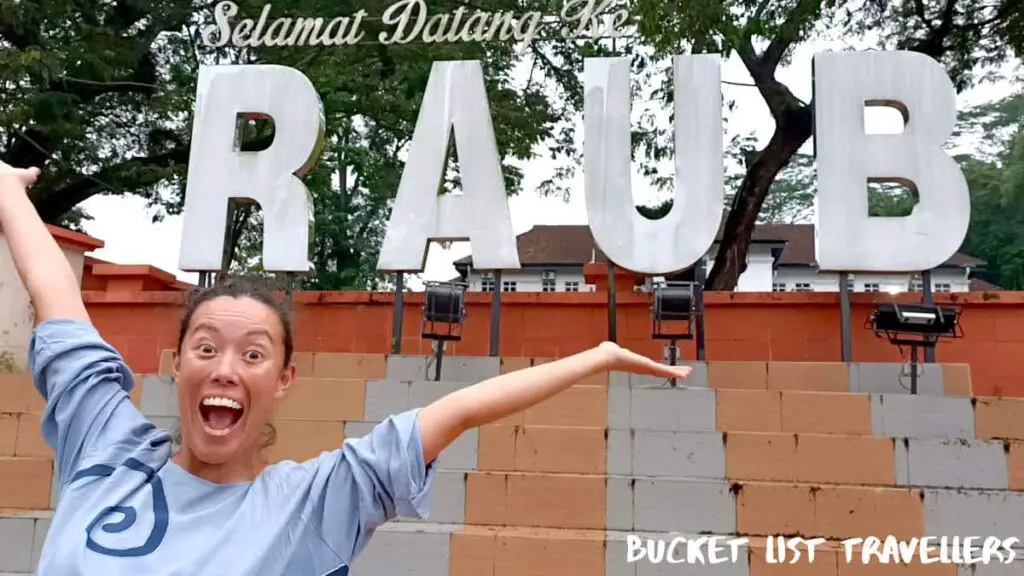
- City name in other scripts – ﺭﺍؤﺏ (Jawi), 劳勿县 (Chinese), ரவுப் (Tamil)
- Language – Malay. Pahang Malay is a dialect of Malay spoken in Raub. Specifically, there is a sub-dialect of Pahang Malay of Raub. There are 10 dialects of Malay used throughout thought the country, with Standard Malay being the unifying language. English is becoming more widely spoken in the country. However not everyone you meet will be able to speak English. Mandarin Chinese, Malaysian Chinese, Tamil, other Indian languages as well as Creole are spoken by the various ethnic groups that live in Malaysia.
- Currency – Malaysian ringgit (MYR). This has been the official currency of Malaysia since 1967. Currency exchanges are available in most cities and ATMs are also available widely throughout the country.
- Population – 91,731 (2010)
- Area – 977 km2 (377 sq mi)
- District – Raub
- State – Pahang
- Emergency number – 999
- Police number – 999
Utilities in Raub Malaysia
- Electricity – Malaysia uses Type G power plugs. The country operates on a 240v supply voltage at 50Hz. Power outages are reasonably common in Malaysia.
- Water – the tap water in Malaysia is not generally safe to drink. Tap water is usually treated, but pipes may be old. Therefore most locals boil their water or use a water filter just to be safe.
- Toilets – sit-down flushing toilets as well as Asian style squat toilets are common in Malaysia. Toilets generally come equipped with a spray hose (sometimes referred to as a Muslim shower). The spray hose is like a European bidet and is used for cleaning personal areas as an alternative to toilet paper. All of the accommodation we stayed in throughout the country was equipped with the western style sit-down flushing toilets with spray hoses. Toilet paper is also usually provided. Don’t flush your toilet paper – use the bins provided. The use of bathroom slippers is customary and is provided in accommodation and sometimes also in public bathrooms. Public bathrooms often offer both sit-down and squat style toilets. Public toilets are common in Malaysia. The charge is usually around 30-50 sens.
- Telephone country code: +60
Where is Raub Malaysia?
Raub is in the Raub district in the middle of the state of Pahang Malaysia. The town is close to the road Federal Route 8, which conntects Kota Bharu with Kuala Lumpur. Raub is an inland town in the middle of Peninsular Malaysia.
The closest towns to Raub are Fraser’s Hill, Kuala Lipis and Genting Highlands. Raub is 1 hour by car from Fraser’s Hill, 1.25 hours by car from Kuala Lipis and 1.5 hours by car from Genting Highlands.
How to get to Raub Malaysia
Raub destination guide: Arriving by land
Raub Malaysia intercity land transport
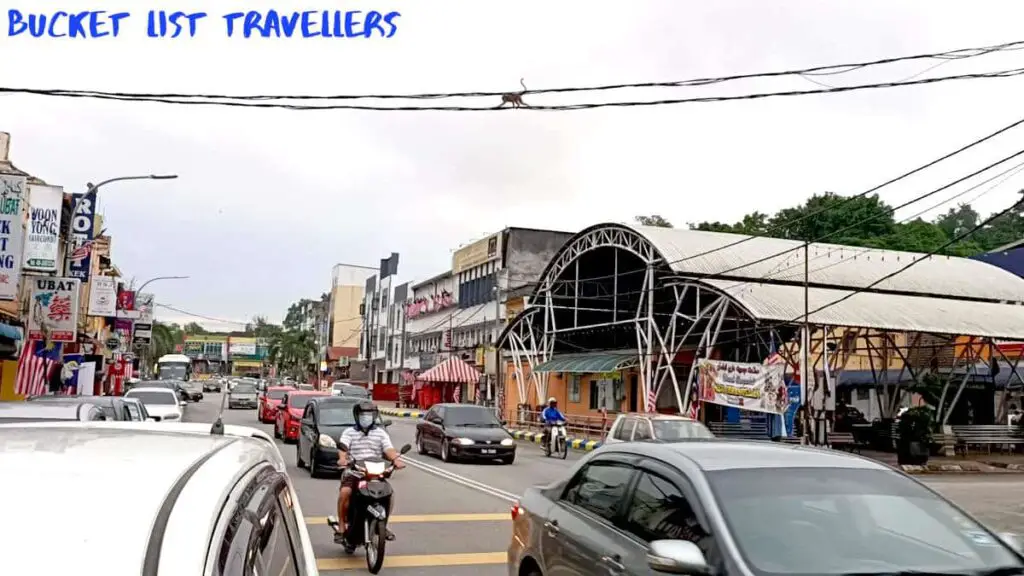
The main transport options for travelling overland to Raub Malaysia are:
- Private vehicle
- Private transport operator
- Bus
- Bike
Driving to Raub from within Malaysia
If you are driving to Raub from within Malaysia, here are the travel times and distances:
- Kuala Lipis, Pahang – 1 hour 1 minute (58km, 36miles) without tolls
- Fraser’s Hill – 1 hour 16 minutes (43km, 27miles) without tolls
- Genting Highlands – 1 hour 28 minutes (90km, 56miles) with tolls, 1 hour 47 minutes (93km, 58miles) without tolls
- Kuala Lumpur – 1 hour 31 minutes (106km, 66miles) with tolls or 2 hours 32 minutes (107km, 66miles) without tolls
- Cameron Highlands – 2 hours 18 minutes (144km, 89miles) without tolls
- Kuantan, Pahang – 2 hours 39 minutes (220km, 137miles) with tolls or 3 hours 41 minutes (223km, 139miles) without tolls
- Malacca, Malacca – 3 hours 59 minutes (250km, 155miles) with tolls or 4 hours 24 minutes (247km, 153miles) without tolls
- Kota Bharu, Kelatan – 5 hours 9 minutes (335km, 208miles) without tolls
- Kuala Terengganu, Terengganu – 4 hours 24 minutes (416km, 258miles) with tolls, 6 hours 30 minutes (424km, 263miles) without tolls
- George Town, Penang – 5 hours 37 minutes (365km, 227miles) with tolls or 7 hours 12 minutes (406km, 252miles) without tolls
- Johor Bahru, Johor – 5 hours 35 minutes (434km, 270miles) with tolls or 6 hours 55 minutes (433km, 269miles) without tolls
Intercity trains to Raub Malaysia
Raub does not have a train station. The closest train station is at Kuala Lipis, which is 1 hour drive away.
Intercity buses to Raub Malaysia
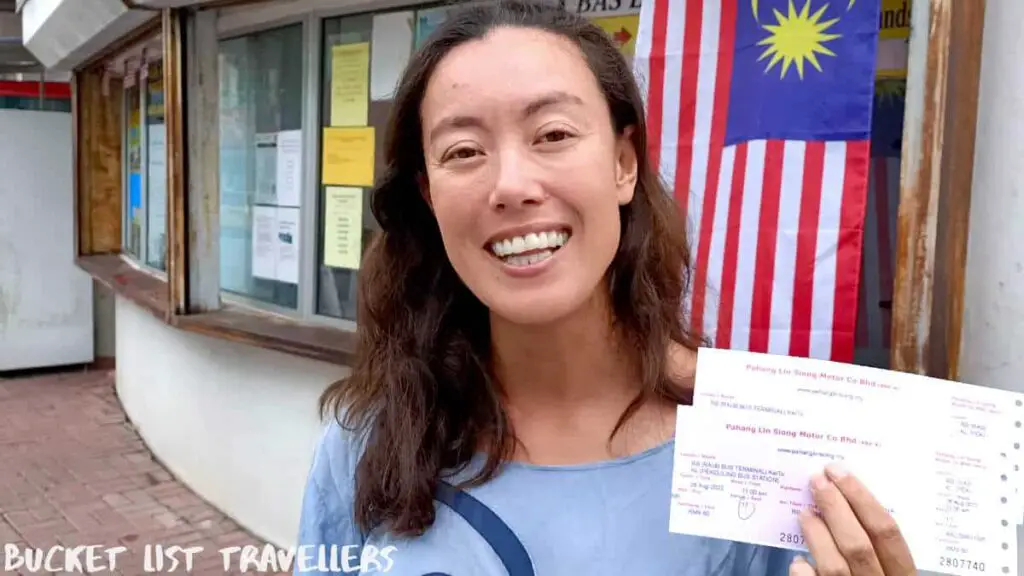
A common way to get around Malaysia is by using intercity buses. These are budget friendly and the network is extensive. Intercity bus companies in Malaysia include KKKL Express as well as S&S International.
Popular bus destinations from Raub include:
- Kuala Lumpur Malaysia – travel time 1.5 hours. Tickets start from 9 ringgit one way.
- Kuala Lipis Malaysia – travel time 1 hour. Tickets start from 5 ringgit one way.
Raub destination guide: Arriving by air
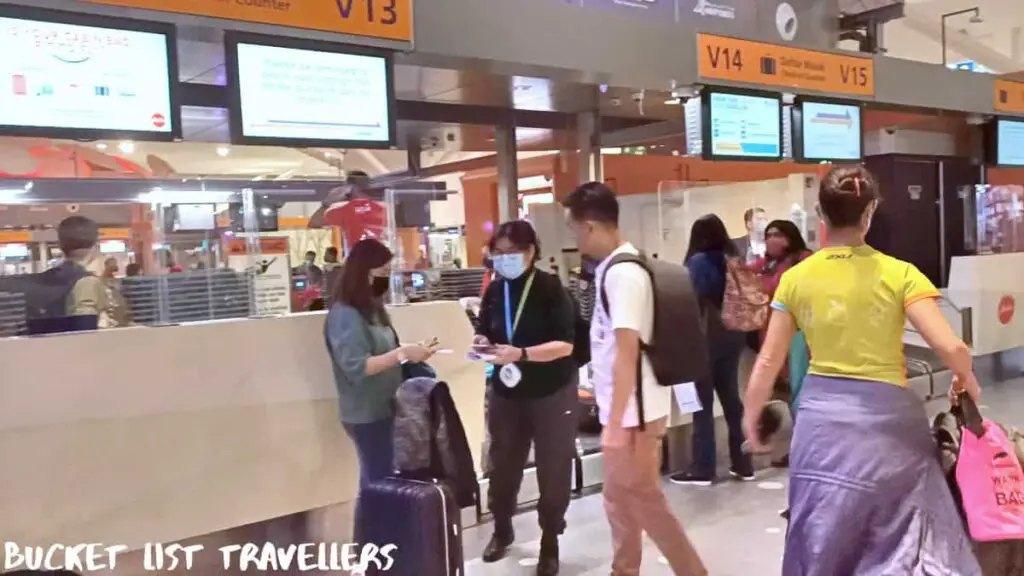
The closest airport to Sultan Abdul Aziz Shah Airport (Airport code SZB). This airport is 81km (50 miles) away.
Other nearby airports include:
- Kuala Lumpur International Airport (Airport code KUL). This airport is 117km (73 miles) away.
- Raub is Sultan Azlan Shah Airport (IPH). This airport is 121km (75 miles) away.
- Sultan Haji Ahmad Shah Airport (Airport code KUA). This airport is 150km (93 miles) away.
The national airline of Malaysia is Malaysia Airlines.
Raub destination guide: Arriving by boat
There are no regular boats to Raub.
Raub destination guide: How to get around Raub Malaysia
Walking in Raub Malaysia
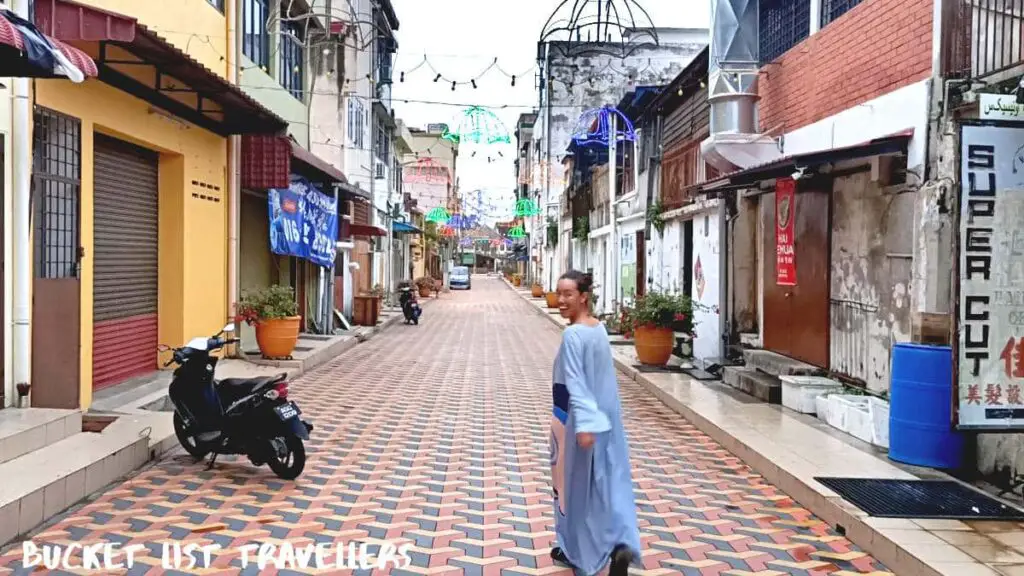
By far the easiest and cheapest way to get around Raub is to walk. Most of the main attractions in the town are within easy walking distance.
Local buses in Raub Malaysia
There are no local buses in Raub.
Trams in Raub Malaysia
Raub does not have a tram system.
Local trains in Raub Malaysia
Raub does not have a local train line.
Metro trains (subway or underground) in Raub Malaysia
Raub does not have an underground train line.
Vehicle hire in Raub Malaysia
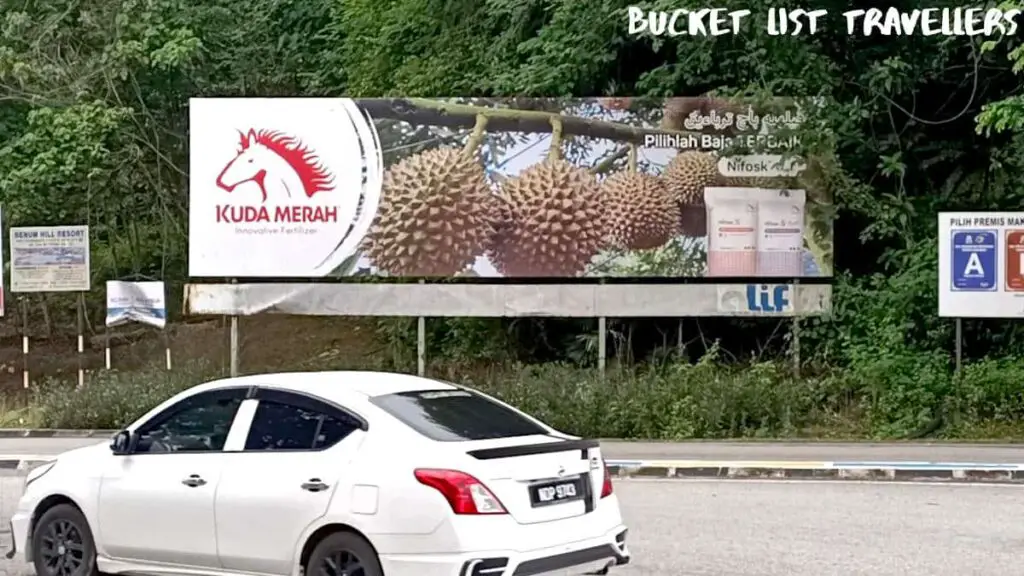
A wide variety of vehicles can be rented in Malaysia. This includes:
- Electric scooters
- Bicycles
- Motorcycles
- Cars
- SUVs
- Boats
In Malaysia they drive on the left side of the road.
Taxis in Raub Malaysia
Raub has taxi services. If you ask someone at the bus terminal, they will be able to organise a taxi for you.
Taxis are common in Malaysia. Fares are regulated and are usually metered. However taxi drivers in Malaysia do not have the best reputation, which is why alternative services like Grab are very popular.
In general your fare will include the following costs:
- The pickup fee or minimum fee – this charge applies as soon as you get into the vehicle.
- Airport surcharge – this additional fixed fee applies when travelling to an airport.
- Price per kilometre – the rate is double between midnight and 6am.
- Price per hour – this is a price that gets charged when the taxi is stuck in heavy traffic.
- Surcharge for more than 2 adult passengers – this is an additional fixed fee.
- Surcharge for using the luggage compartment – this is an additional fixed fee.
- Surcharge for booking by phone – this is an additional fixed fee.
- Road toll charges
Check that the meter gets switched on at the start of your journey at the right rate. We also recommend bringing enough change in cash as drivers generally only accept cash and may not have change.
Alternatively, if booking in advance the fare may be a fixed price that is agreed on before the trip. Some taxis also operate on a pre-paid coupon system where the coupon is purchased from a counter at the airport.
It is not necessary or expected to tip taxi drivers in Malaysia.
Ride-share services in Raub Malaysia
Raub is a small town, so the major ride-share services do not operate here. However you may be able to pay a local to drive you around.
Grab is the main app based ride-hailing service in Malaysia. Other ride-share services in Malaysia include MyCar, MULA, DACSEE, EzCar, inDriver as well as the women only service Riding Pink. Uber no longers operates in Malaysia after Grab acquired all of its Southeast Asia assets. Lyft services only Kuala Lumpur in Malaysia via its Grab partnership.
Raub destination guide: Is Raub Malaysia worth visiting?
Raub has many attractions which make it special. Foodies flock to the area to taste the freshest and best durian fruit in Malaysia. For history buffs, Raub is a must visit as one of the oldest towns in Pahang. Raub also has beautiful temples and a great food scene. Additionally Raub’s close proximity to the popular tourists destinations of the Genting Highlands and Cameron Highlands makes it well worth a visit.
Raub destination guide: How long to spend in Raub Malaysia
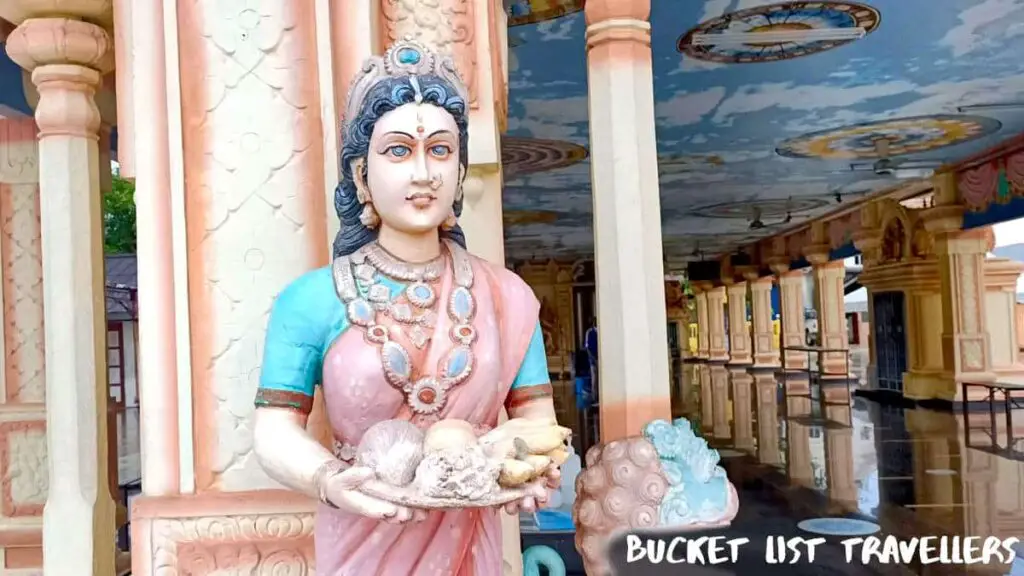
Raub is a historic city which is famous for its durians. It has contains some beautiful religious and historical buildings and also has a great food scene. Located in the state of Pahang, it is only 1.5 hours drive away from Kuala Lumpur. As the gateway to a number of beautiful resort areas such as the Genting Highlands and Cameron Highlands, it is perfect for a short stop over on your way to hillside retreat. However if you have more time to spare, this is a great value destination that could easily keep you entertained for a few days. We spent 3 nights in Raub and enjoyed visiting religious buildings, meeting the locals and admiring out surroundings.
Raub destination guide: What to do in Raub Malaysia
Raub is a scenic Malaysian town with a number of interesting activities on offer. It has a range of great free activities as well as paid activities.
Raub destination guide: Free things to do in Raub Malaysia
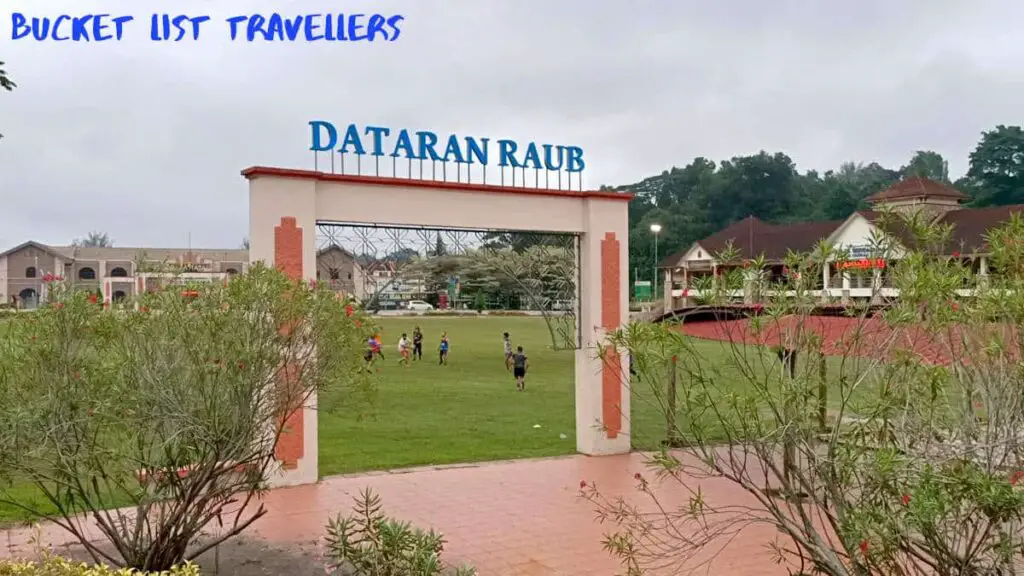
There are enough free activities in Raub Malaysia to keep you entertained for a day or two:
- Tras Road Guang Yin Temple
- Pulau Chekas Riverpools
- Dataran Raub
- Sri Siva Subramaniam Temple
- Kuan Yin Temple
- Pasar Besar Raub
- Masjid Daerah Raub – Tengku Abu Bakar Raub
- Clock Tower Raub
Raub destination guide: Paid activities in Raub Malaysia
A number of attractions in Raub Malaysia charge an entry fee:
- Yes Durian Orchard
Weather in Raub Malaysia
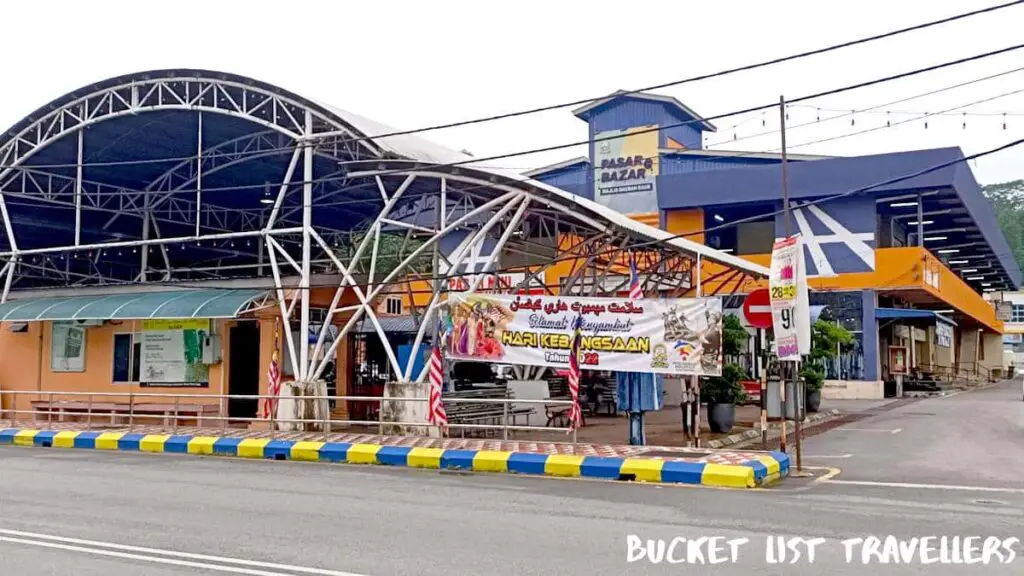
The climate for Raub is classified as tropical, with relatively uniform hot temperatures and also high humidity throughout the year. The hottest month is May with an average temperature range of 23°C to 32°C (73°F to 90°F) and coldest month December with an average temperature between 22°C to 30°C (72°F to 87°F). There are two monsoon seasons in Malaysia, November to early March, which is typically the most rainy, and June to September. The period of March through to June between the two monsoons is the hottest and also the most uncomfortable weather of the year.
Internet and mobile phones in Malaysia
Major internet and phone companies in Malaysia – Celcom, Digi, Hotlink (Maxis), U Mobile, UniFi Mobile, Tune Talk, Yes, XOX Mobile / ONEXOX, redONE, Yoodo, Telekom Malaysia and Time dotCom.
5G has been in Malaysia since December 2021. 2G will not be be switched off in Malaysia. 3G is was switched off in March 2022.
Malaysia is ranked 61st fastest in the world for mobile internet speeds and 38th fastest for fixed broadband. For Fixed Broadband the average download speed is 90mbps and upload is 51mbps (as at October 2022).
Cell phone SIM cards can be bought in a numbers of places throughout Malaysia. These include phone stores, in shopping malls, at bus stations as well as at airports. Some form of ID, such as a passport, is required in order to purchase a SIM card in Malaysia.
How much to budget for Raub Malaysia?
Raub destination guide: Daily spend for a couple travelling in Raub Malaysia

As a rough guide, we recommend the following budgets for a couple:
- Low-budget daily spend – 150 ringgit per day for a couple will get you hostel accommodation, meals from bakeries and markets, local transport and free or cheap activities such as visiting shopping centres and markets
- Mid-range daily spend – 300 ringgit per day for a couple will get you mid-range accommodation, local transport, restaurant meals and a few paid activities
- Luxury spend – Raub is not a luxury destination
Raub destination guide: Accommodation in Raub Malaysia
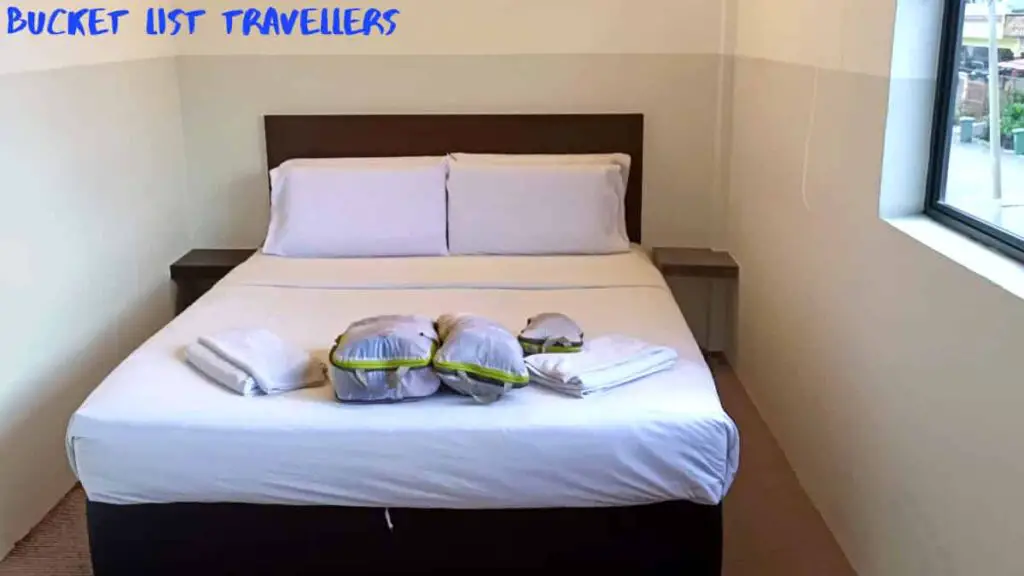
There is a good range of accommodation to suit most budgets in Raub Malaysia. Airbnb operates in Malaysia, and there are a number of Airbnb properties in Raub. Wifi is not always provided for Airbnb properties in Malaysia, so we recommend checking if it is included in the listing. One thing to keep in mind with hotels in Malaysia is that smoking in hotel rooms is often permitted.
Where to stay in Raub Malaysia
We recommend the following accommodation in Raub Malaysia:
- Best hotel in Raub Malaysia – We highly recommend staying at Hotel Raub since 1968 when visiting Raub. We stayed here on during our Raub trip and had a very comfortable stay. This non-smoking property has spacious rooms and our room also had a lot of natural light. The hotel is a short walk from the centre of town and there are a number of nice food places nearby. The staff were also very friendly and helpful.
How much is accommodation in Raub Malaysia?
For short-term accommodation, a general price per night is as follows:
- Budget accommodation – there is no dorm accommodation in Raub. The cheapest accommodation is 40 ringgit for a private room.
- Mid-range accommodation – 83-120 ringgit for a private room.
- Luxury accommodation – there is no luxury accommodation in Raub.
- Rental property – 370-570 ringgit a night for a fully furnished 3-4 bedroom home.
Tourist tax on accommodation in Malaysia
From 1 January 2023 there is a tourist tax of 10 ringgit per accommodation per night in Malaysia. This tax is collected by the property. Permanent residents and Malaysian nationals are exempt from the tax. Furthermore the tourist tax does not apply to homestays and kampung stays registered with the Ministry of Tourism.
Raub destination guide: Food in Raub Malaysia
Raub is Malaysia’s durian capital. If you’re there during durian season, be sure to sample some famous Musang King durians!
How much does food cost in Raub Malaysia?
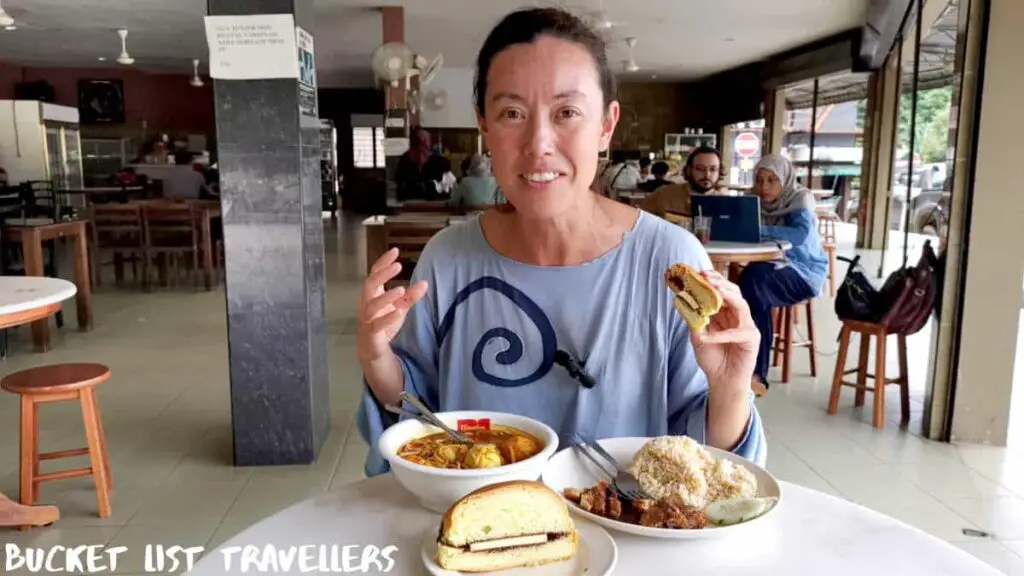
Our price guide for your food budget in Raub Malaysia is as follows (prices as at 2022):
- Restaurant meal – 30-60 ringgit for a main dish
- Night market or hawker market food – 5-15 ringgit for a dish
- Ais kachang – 4-6 ringgit
- Coffee – 1.50-2.50 ringgit
Must eat food in Raub Malaysia
- Durian – Raub is the durian capital of Malaysia
- Fish head curry from Ratha Curry House
Cheap Eats in Raub Malaysia
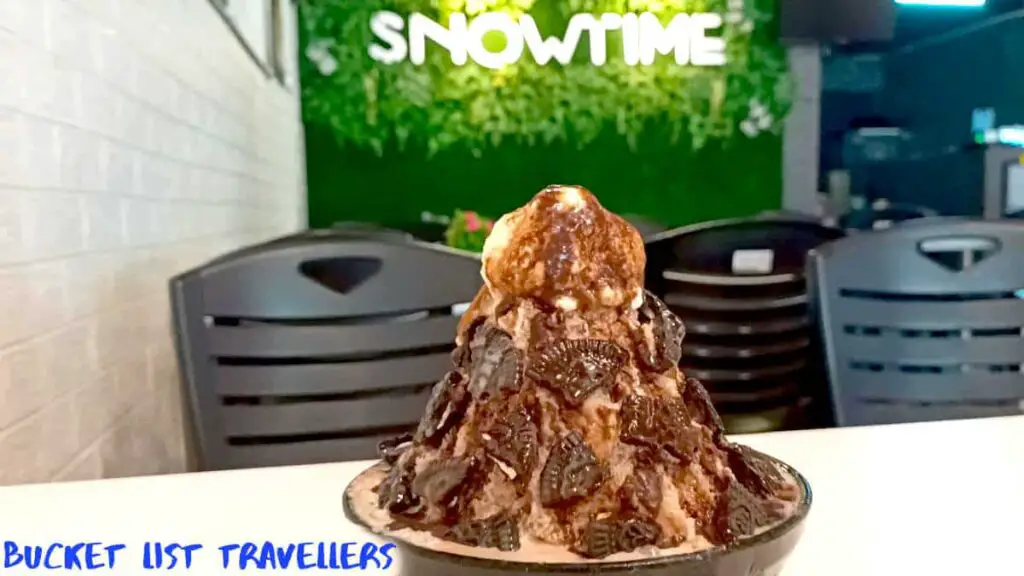
- Bakeries are a great place to get cheap and delicious food.
- Hawker centres in Malaysia are ubiquitous and have excellent budget friendly food. The variety of stalls available means that you have a good range of options to choose from.
- Night markets in Malaysia are another of our go to places for affordable and tasty food. There’s also usually stalls selling items like clothes, toys and shoes in addition to the food stalls.
- Street food is also a very common cheap eat option in Malaysia. You can often find street food around transport hubs as well as scattered in various places around the city.
Raub Malaysia culture
Weekends in Pahang Malaysia
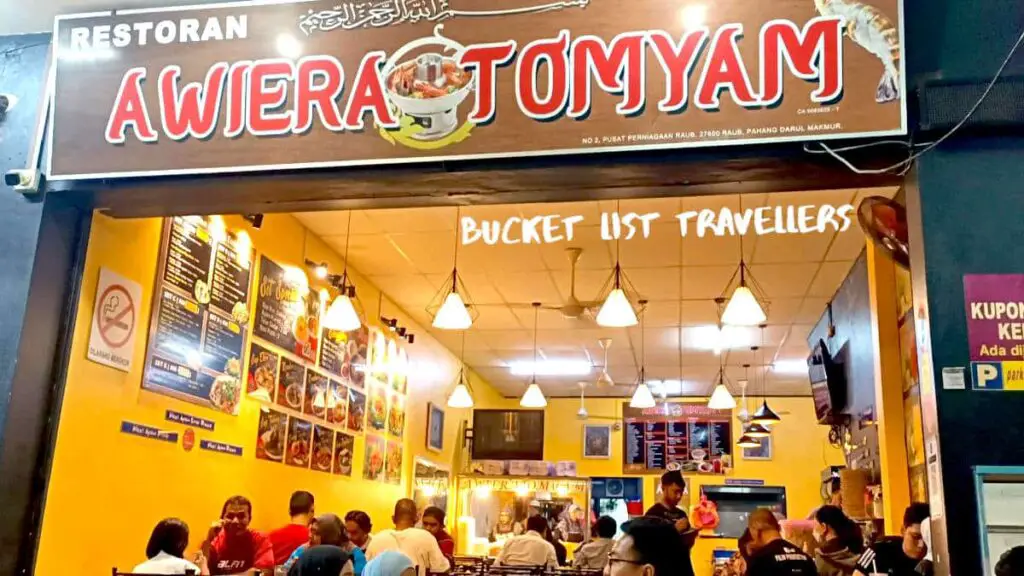
Which days are weekdays and weekend days vary in Malaysia depending on the state you’re in. In the state of Pahang weekdays are Monday to Friday and weekends are Saturday and Sunday. Keep this in mind as weekends can affect prices and availability (particularly for accommodation). Additionally weekends may impact opening hours as well as how crowded attractions are.
Pahang public holidays
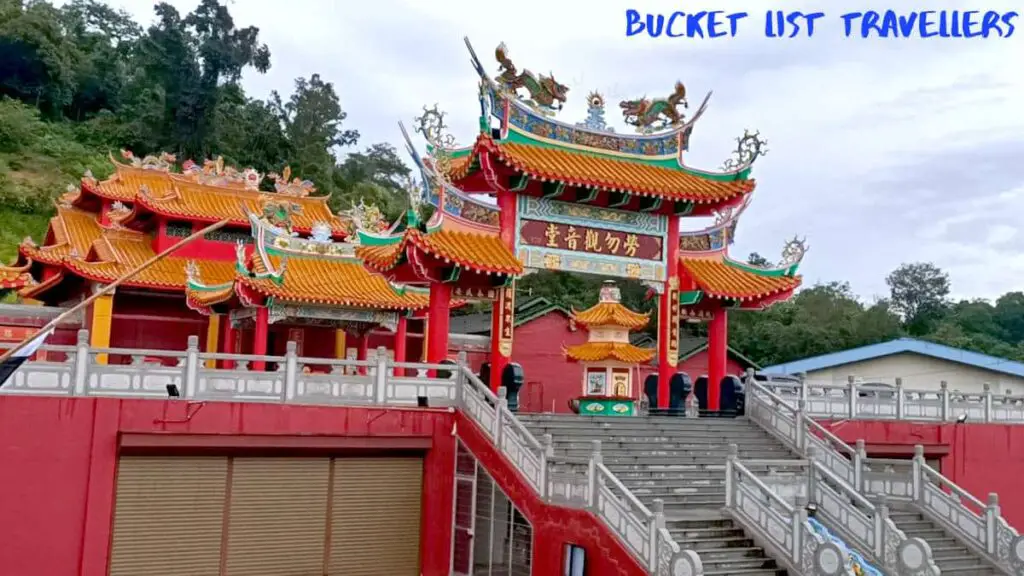
Malaysia has one of the highest number of public holidays in the world. In total, there are between 18 and 20 public holidays observed in each state. This includes national holidays as well as state based holidays. Public holidays for the state of Pahang are as follows:
- New Year’s Day – 1st January
- Chinese New Year’s Day – 1st day of 1st lunar month, in January or February
- Chinese New Year Holiday – 2nd day of 1st lunar month, in January or February
- Labour Day – 1 May
- Wesak Day (Buddha’s birthday) – May or June, date varies
- Hari Hol Pahang – 22 May
- Hari Nuzul Al-Quran – 17th day of Ramadan, date varies
- Hari Raya Aidilfitri or Hari Raya Puasa – the last day of Ramadan, date varies
- Hari Raya Aidilfitri Holiday or Hari Raya Puasa Holiday – day after the last day of Ramadan, date varies
- Yang di-Pertuan Agong’s Birthday (King’s Birthday) – 1st Monday in June
- Sultan of Pahang’s Birthday – 30 July
- Hari Raya Qurban (Aidiladha) (Feast of the Sacrifice) – date varies
- Awal Muharram (Islamic New Year) – date varies
- Merdeka Day (National Day, Independence Day) – 31 August
- Malaysia Day – 16 September
- Maulidur Rasul (Prophet Muhammad’s Birthday) – 12th day of the 3rd month of the Islamic calendar
- Deepavali – date varies, October or November
- Christmas Day – 25 December
National symbols of Malaysia
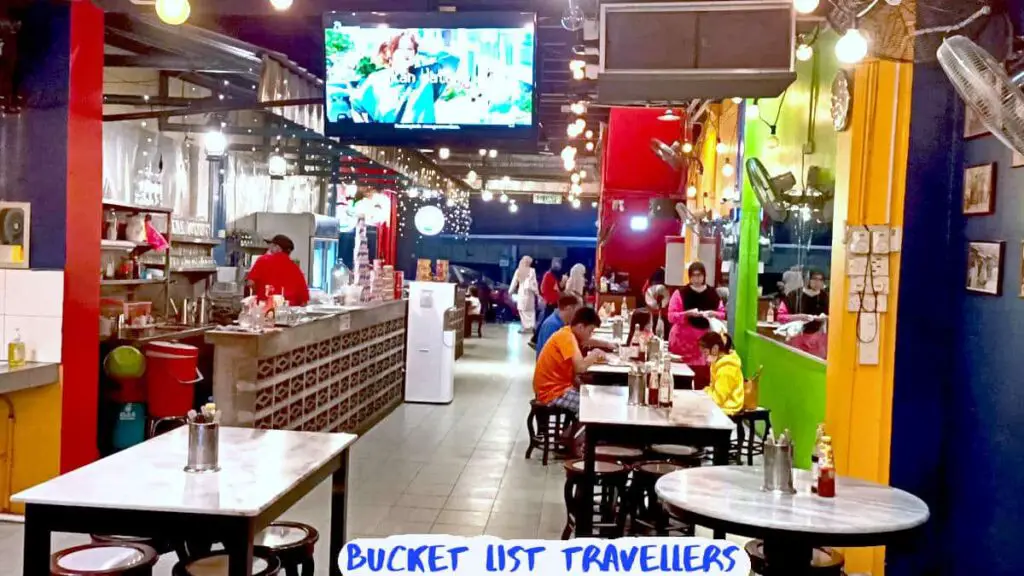
- Malaysia flag – 14 alternating red and white stripes with a blue canton with a yellow crescent and 14 pointed star. The Malaysian flag is called the Stripes of Glory.
- Malaysia coat of arms – two tigers supporting a shield with a yellow crescent and a 14 pointed star on top and a yellow banner with words that translate to “Unity is strength” written in both romanised Malay and Jawi at the bottom.
- National flower – hibiscus
- National bird – rhinoceros hornbill
- Malaysia national animal – the Malayan tiger
Malaysia pastimes
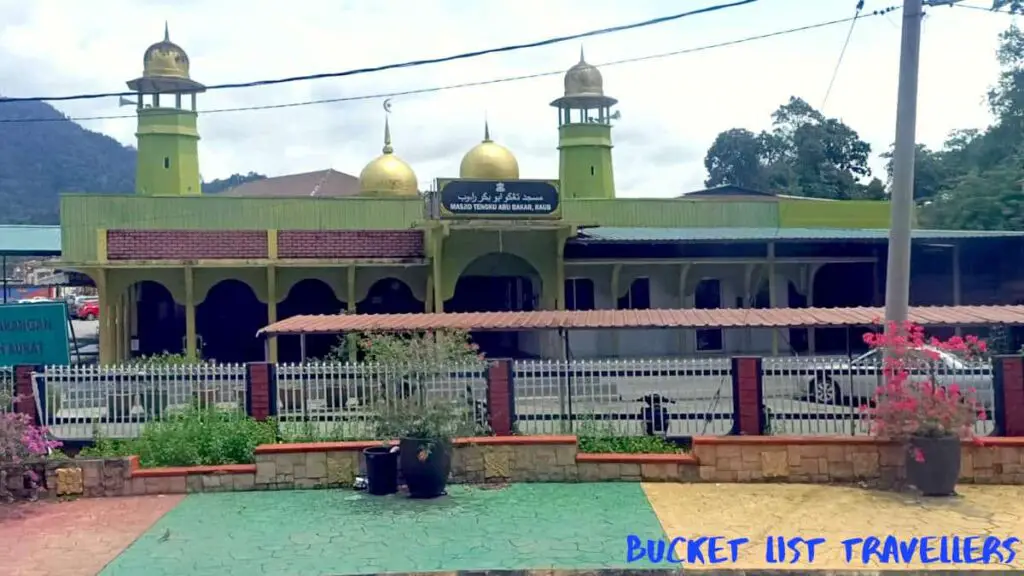
- National dish – nasi lemak
- Popular drinks – teh tarik, Ipoh white coffee, milo ais, sirup bandang
- National sport – sepak takraw
- Religion – 64% Islam, 19% Buddhist, 9% Christian, 6% Hindu (as at 2020)
Is Raub Malaysia Safe?
Malaysia travel guide: Safety in Malaysia
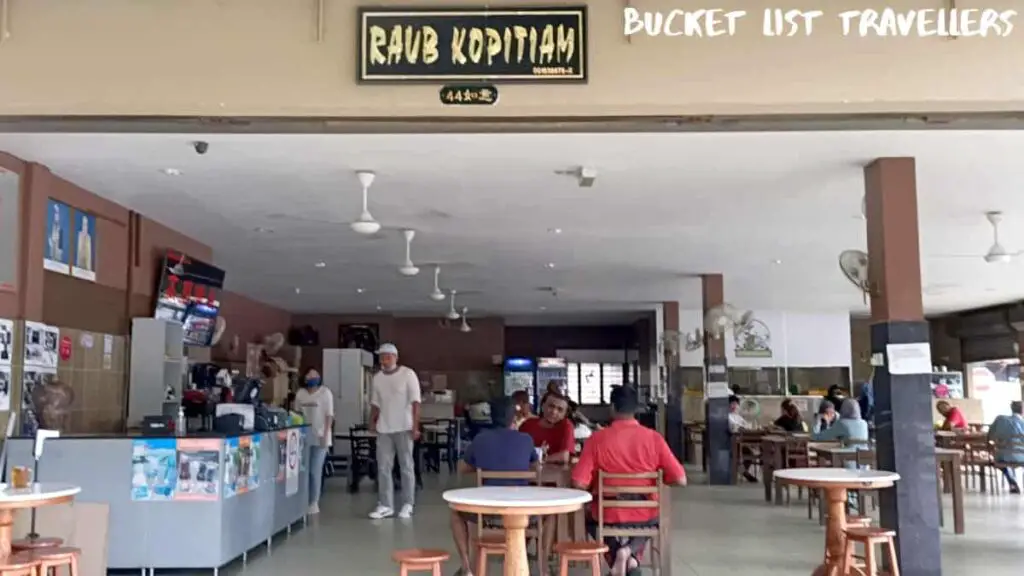
We have spent around 4 months travelling extensively through Malaysia over two separate trips. In our experience the country is extremely safe. Malaysia ranks 18th safest country on the Global Peace Index (as at 2022). As with any country, there are good areas and bad areas. Watch out for pickpockets and bag snatching particularly at crowded tourist attractions. In particular, when eating out don’t leave your bag, phone or wallet on the table or next to you where someone can quickly grab it and run away. Instead keep your belongings physically attached to you at all times. Make sure no-one is watching whenever you are entering pin codes and never lose sight of your credit card when making a purchase.
General safety considerations in Malaysia
Other general safety considerations for travel in Malaysia:
- Drinking water – tap water in Malaysia is not generally safe to drink. Tap water is usually treated, but pipes may be old. Most locals boil their water or use a water filter.
- Mosquitoes – mosquito borne illnesses are a significant risk in Malaysia, particularly dengue, Zika and chikungunya. Malaysia is in the pre-elimination phase of malaria. While malaria is a greater risk in Malaysian Borneo, there have also been cases on the Malaysian peninsula. Take precautions to avoid mosquito bites.
- Altitude sickness – Malaysia has areas of high altitude and therefore altitude sickness risk. If you visit high altitude areas in Malaysia, allow sufficient time to acclimatise. If you experience signs of altitude sickness, including headache, nausea or vomiting, dizziness, tiredness, loss of appetite or shortness of breath, get help immediately.
- Road safety – Road accidents are a significant risk in Malaysia. While road conditions in Malaysia are generally very good, traffic is often very heavy. Furthermore drivers in Malaysia tend to speed up rather than slowing down for amber lights. We also found that roads in Malaysia are not typically built with pedestrians in mind, and footpaths often stop unexpectedly in busy areas.
- Water safety – take care when swimming as currents and waves may be stronger than you expect.
- Earthquakes – Malaysia experiences both regional and local earthquake activity. In an earthquake, stay away from glass, windows, outside doors and walls and anything that could fall. If inside, get under a table, desk or solid furniture and hang onto it. Cover your head and torso to protect from falling objects. If outside, stay outside and go to an open area away from buildings.
- Sun safety – Exposure to the sun can have adverse short-term and long-term effects on the skin, eyes and immune system. Sun protection such as sunscreen, a hat and sunglasses is very important to ensure you don’t get burnt.
- Dogs – rabies from rabid dog bites is a risk in Malaysia. For more on dog safety while travelling, check out this video.
As with any destination, take all of your normal safety precautions.
Malaysia Blogs
You can find our Malaysia travel blogs below.
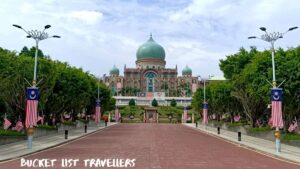
Putrajaya Destination Guide: Everything You Need to Know (2024)
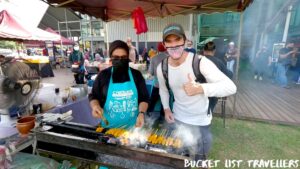
Cyberjaya Destination Guide: Everything You Need to Know (2024)
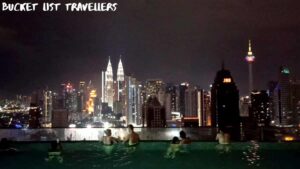
Kuala Lumpur Destination Guide: Everything You Need to Know (2024)

Raub Destination Guide: Everything You Need to Know (2024)
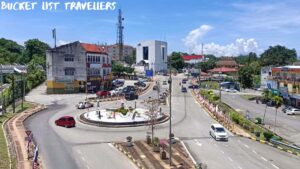
Kuala Lipis Destination Guide: Everything You Need to Know (2024)
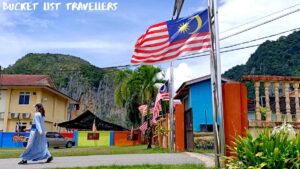
Gua Musang Destination Guide (2024): What You Need to Know
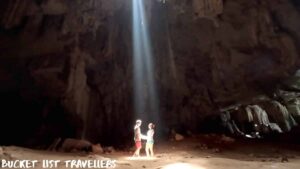
Dabong Destination Guide (2024): What You Need to Know
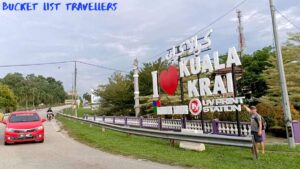
Kuala Krai Destination Guide (2024): What You Need to Know
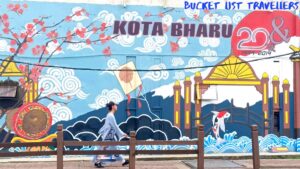
Kota Bharu Destination Guide (2024): What You Need to Know
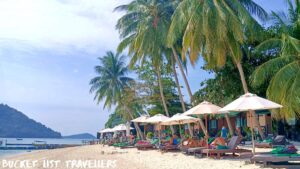
Perhentian Islands Destination Guide (2024): What You Need to Know
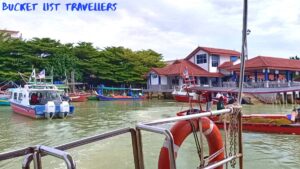
Kuala Besut Destination Guide (2024): What You Need to Know
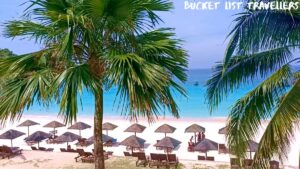
Redang Island Destination Guide (2024): What You Need to Know
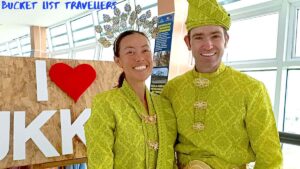
Kuala Terengganu Destination Guide (2024): What You Need to Know
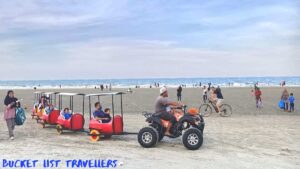
Kuantan Destination Guide (2024): What You Need to Know
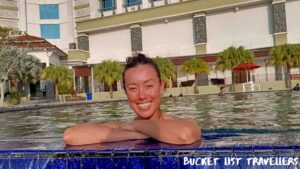
Pekan Destination Guide (2024): What You Need to Know
Affiliate Links
This website contains affiliate links, which means we may earn a commission on any purchases at no additional cost to you. Your support helps us continue our travels and make more travel blogs and travel videos, thank you!
